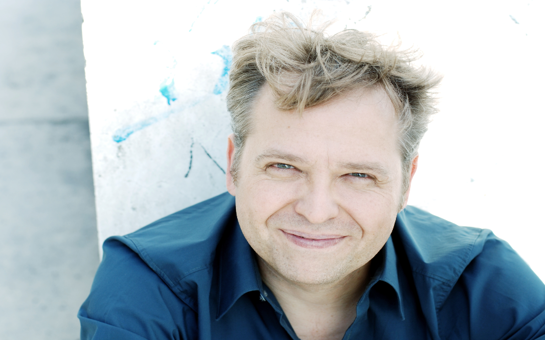- Arnulf Herrmann
Hotel Europa (2025)
(for chamber choir and 9 instruments)- Henry Litolff’s Verlag GmbH & Co. KG (World)
- mixedch; fl(afl).2cl(2bcl)/hn.tbn/perc/va.vc.db
- SATB (min. 8S/8A/8T/8B)
- 35 min
- Golgona Anghel / Odile Kennel (transl.), Händl Klaus, Kamil Bouška / Eduard Schreiber (transl.) and Sasha Dugdale /Jan Wagner (transl.)
Programme Note
Europe is always both myth and utopia (...)
Perhaps it is precisely in the poem, this by no means outmoded piece of linguistic art, that Europe's current fears, hopes, expectations and tensions can become visible as if under a burning glass, as the poem allows a particularly precise and illuminating view of the conditions and moods in the north, south, east and west of the continent.
– Federico Italiano und Jan Wagner
Four texts from four points of the compass in Europe, three of them in translation, are set in relation to each other in one piece. All the texts are set in rooms, in the house, and illuminate different existential experiences and events, from the intimate moments of a couple (Die Vögel fallen wie Steine vom Himmel/The birds fall like stones from the sky) to elusive threatening situations (Chor im Morgengrauen/Dawn Chorus).
The exchange with a counterpart who speaks a different language, but is not fundamentally different, is the normal state of affairs in Hotel Europa. The versatility and diversity is the great benefit of this project, which is increasingly being called into question and must be defended.
In Hotel Europa, for the four texts four contrasting musical characters are interwoven in such a way that, ideally, a breathing whole emerges. Approximately 35 minutes of music attempt to unite the diversity into a single arc on the levels of tempo, harmony, shaping of time, density, etc., while at the same time preserving the individuality of each.
______________________________________________________________________________________________________________________________________
My special thanks go to the poets and translators for the openness and unselfishness with which they have made their texts available to me.
The translation does not want to compete with the original, nor does it want to imitate it. It is first and foremost an expression of the confrontation with foreignness on the most human level – the language.
– Esther Kinsky
Scores
More Info

- RIAS Kammerchor Berlin premieres Arnulf Herrmann’s Hotel Europa
- 28th May 2025
- Hotel Europa by Arnulf Herrmann will be premiered by RIAS Kammerchor & Ensemble Musikfabrik, conducted by Justin Doyle on June 04.

 Located in the UK
Located in the UK
 Located in the USA
Located in the USA
 Located in Europe
Located in Europe